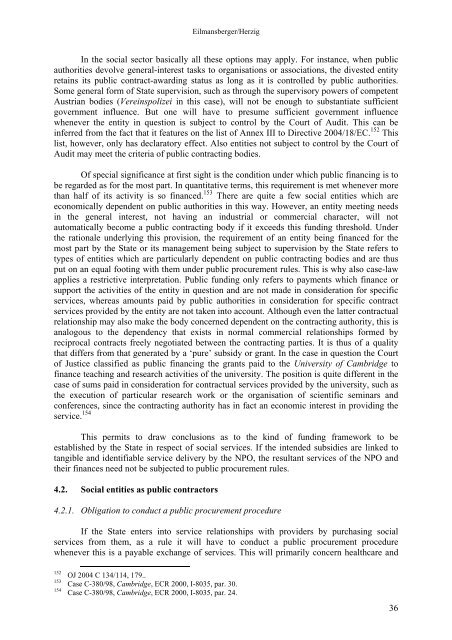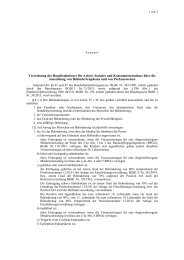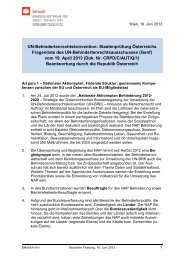Social Services of General Interest (SSGI)
Social Services of General Interest (SSGI)
Social Services of General Interest (SSGI)
Create successful ePaper yourself
Turn your PDF publications into a flip-book with our unique Google optimized e-Paper software.
Eilmansberger/Herzig<br />
In the social sector basically all these options may apply. For instance, when public<br />
authorities devolve general-interest tasks to organisations or associations, the divested entity<br />
retains its public contract-awarding status as long as it is controlled by public authorities.<br />
Some general form <strong>of</strong> State supervision, such as through the supervisory powers <strong>of</strong> competent<br />
Austrian bodies (Vereinspolizei in this case), will not be enough to substantiate sufficient<br />
government influence. But one will have to presume sufficient government influence<br />
whenever the entity in question is subject to control by the Court <strong>of</strong> Audit. This can be<br />
inferred from the fact that it features on the list <strong>of</strong> Annex III to Directive 2004/18/EC. 152 This<br />
list, however, only has declaratory effect. Also entities not subject to control by the Court <strong>of</strong><br />
Audit may meet the criteria <strong>of</strong> public contracting bodies.<br />
Of special significance at first sight is the condition under which public financing is to<br />
be regarded as for the most part. In quantitative terms, this requirement is met whenever more<br />
than half <strong>of</strong> its activity is so financed. 153 There are quite a few social entities which are<br />
economically dependent on public authorities in this way. However, an entity meeting needs<br />
in the general interest, not having an industrial or commercial character, will not<br />
automatically become a public contracting body if it exceeds this funding threshold. Under<br />
the rationale underlying this provision, the requirement <strong>of</strong> an entity being financed for the<br />
most part by the State or its management being subject to supervision by the State refers to<br />
types <strong>of</strong> entities which are particularly dependent on public contracting bodies and are thus<br />
put on an equal footing with them under public procurement rules. This is why also case-law<br />
applies a restrictive interpretation. Public funding only refers to payments which finance or<br />
support the activities <strong>of</strong> the entity in question and are not made in consideration for specific<br />
services, whereas amounts paid by public authorities in consideration for specific contract<br />
services provided by the entity are not taken into account. Although even the latter contractual<br />
relationship may also make the body concerned dependent on the contracting authority, this is<br />
analogous to the dependency that exists in normal commercial relationships formed by<br />
reciprocal contracts freely negotiated between the contracting parties. It is thus <strong>of</strong> a quality<br />
that differs from that generated by a ‘pure’ subsidy or grant. In the case in question the Court<br />
<strong>of</strong> Justice classified as public financing the grants paid to the University <strong>of</strong> Cambridge to<br />
finance teaching and research activities <strong>of</strong> the university. The position is quite different in the<br />
case <strong>of</strong> sums paid in consideration for contractual services provided by the university, such as<br />
the execution <strong>of</strong> particular research work or the organisation <strong>of</strong> scientific seminars and<br />
conferences, since the contracting authority has in fact an economic interest in providing the<br />
service. 154<br />
This permits to draw conclusions as to the kind <strong>of</strong> funding framework to be<br />
established by the State in respect <strong>of</strong> social services. If the intended subsidies are linked to<br />
tangible and identifiable service delivery by the NPO, the resultant services <strong>of</strong> the NPO and<br />
their finances need not be subjected to public procurement rules.<br />
4.2. <strong>Social</strong> entities as public contractors<br />
4.2.1. Obligation to conduct a public procurement procedure<br />
If the State enters into service relationships with providers by purchasing social<br />
services from them, as a rule it will have to conduct a public procurement procedure<br />
whenever this is a payable exchange <strong>of</strong> services. This will primarily concern healthcare and<br />
152 OJ 2004 C 134/114, 179..<br />
153 Case C-380/98, Cambridge, ECR 2000, I-8035, par. 30.<br />
154 Case C-380/98, Cambridge, ECR 2000, I-8035, par. 24.<br />
36

















